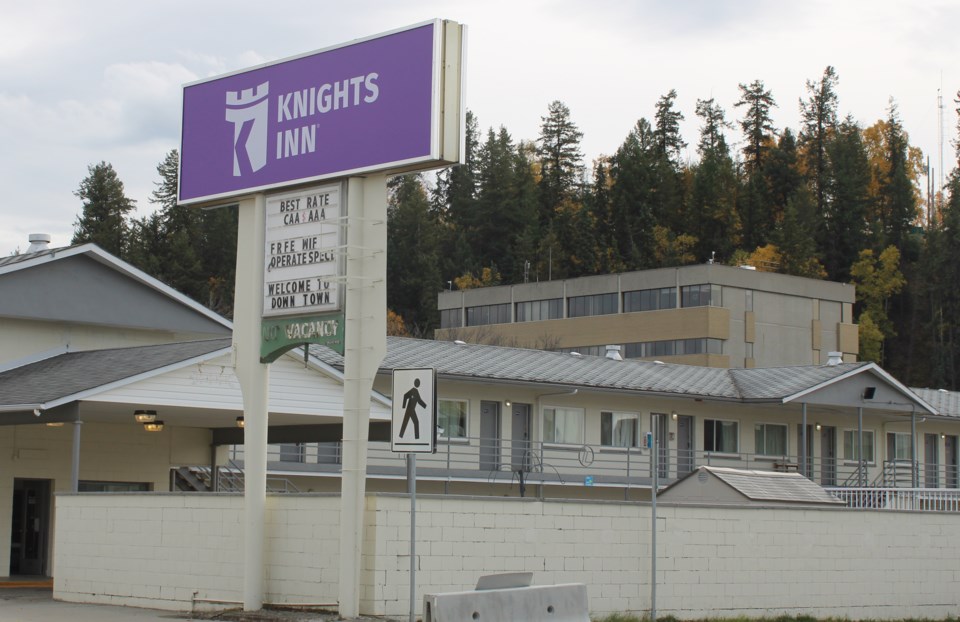The slow demise of the Knights Inn transitional housing project in Prince George is more than just the end of a flawed experiment — it’s proof that BC’s motel-based housing strategy has failed.
It’s also a cautionary tale of poor planning, misplaced investments and squandered taxpayer dollars in the name of temporary relief.
The City of Prince George bought the deteriorating 61-year-old building for a staggering $4.15 million — nearly four times its assessed value of $1.211 million, according to BC Assessment records from July 2023.
Despite serious concerns about the building’s condition — including unsafe stairways, exposed wiring, rodent infestations and compromised water quality — the city chose to invest millions into purchasing a property that was already slated for demolition within a few years.
Supporters of the deal point to a third-party appraisal that matched the property’s inflated market value, as well as financial incentives from B.C. Housing, including $1.134 million up front for a two-year lease and an additional $450,000 toward future demolition costs. (In 2019, the city’s demolition of the Days Inn to make way for the Canfor Leisure Pool cost $2.5 million.)
Mayor Simon Yu has defended the Knights Inn purchase as a smart long-term move, citing its location near the proposed Civic Core as a prime redevelopment site for condominiums or a hotel.
But let’s be clear: this was not a strategic acquisition. It was damage control disguised as forward-thinking vision.
Now, the building is closing early — not because the need for housing has disappeared, but because the building has become uninhabitable.
After three years of use as a last-resort shelter, the structure has buckled under the weight of neglect and inadequate design for its purpose. Holes in the walls, unsafe stairwells and pest infestations are not just maintenance issues — they are symptoms of a broken model.
The Prince George Native Friendship Centre, which operates the former motel, did its best under difficult circumstances, offering meals and wraparound supports to residents. But the reality is that no amount of goodwill can compensate for a decaying, overburdened building.
Meanwhile, Housing Minister Ravi Kahlon’s other local motel conversion — the North Star Inn on Victoria Street — is already facing similar issues, and the initial renovations aren’t even complete.
Phase 2 renovations to the smaller, 30-unit section remain unfinished, with the contractor having to redo areas that were just upgraded. Phase 1 — the larger 60-unit building — has been plagued by fires, vandalism and violent incidents.
These failures paint a clear picture: turning aging motels into housing for people with complex challenges and needs isn’t just unsustainable — it’s dangerous, costly and ineffective.
Prince George still lacks dedicated addiction and treatment facilities for women or youth. There is no long-term care facility for those living with serious mental health issues. And there remains no clear plan for replacement housing or the necessary supports for those still living in these motels.
The city and province have prioritized optics over outcomes. Money has gone into properties that are easier to acquire than repair, bypassing rezoning or public input. The province leans on short-term leases and patchwork renovations instead of investing in purpose-built housing with wraparound services and long-term viability.
Worst of all, it pretends that “supportive housing” in crumbling motels is somehow an acceptable interim solution.
It’s not. It never was.
Homelessness, addiction and mental health care fall under provincial jurisdiction. The city alone cannot solve these crises. Long-term solutions can only come from the province.
If Prince George and the BC government are serious about addressing homelessness, they must stop chasing quick fixes and start delivering permanent, sustainable housing. That means purpose-built facilities with onsite supports, designed from the ground up with dignity, safety and resilience in mind.
The Knights Inn and North Star Inn projects were stopgaps. Their failure was foreseeable.
Let’s hope this is the last time we mistake emergency shelter for a housing strategy.
Have your say in a letter to the editor: [email protected]



